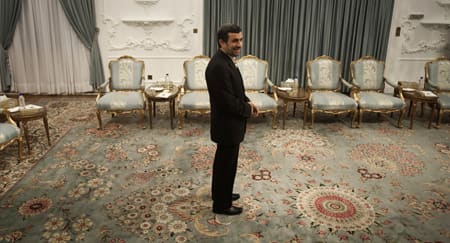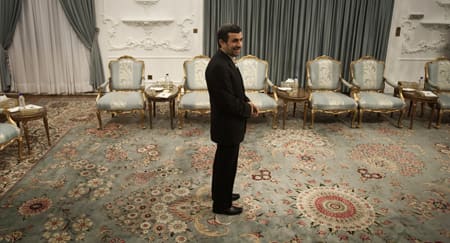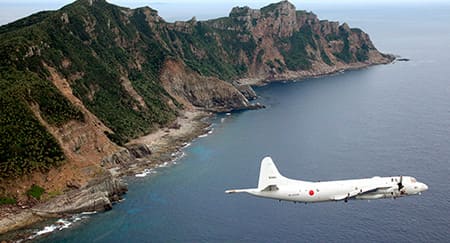NATO Review asked four experts in different parts of international affairs them how they see 2013 panning out. Here we publish their answers, ranging from predictions for the Middle East to Asia.
Louise Arbour
Louise Arbour is President of the International Crisis Group. Prior to this, she served as the United Nations High Commissioner for Human Rights.
Warmongering over Iran’s nuclear programme and Syria’s further disintegration represent great threats to international security in 2013. An Israeli strike on Iran could unleash hell in the region. And an even more ferocious war in Syria - with or without international military involvement - would likely do the same.
Both scenarios seem possible in 2013, expanding the zone of open conflict in the Middle East dramatically with deadly consequences for countless numbers and serious negative impacts on international relations as well.
Michael Brzoska, University of Hamburg
Professor Michael Brzoska is an economist and political scientist who heads up the Institute for Peace Research and Security Policy (IFSH) at Hamburg University
I expect the most significant development to be around Iran, with repercussions in the wider Middle East. With President Netanyahu's party still the largest party in Israel, his deadline of the summer of 2013 for a promising military move against the nuclear programme in Iran will likely stand. Therefore the possibility of a joint Israeli/US attack on Iranian nuclear installations in the summer of 2013 is high. Such an attack would probably have major effects on the security situation in Lebanon, Israel and Iraq – and possibly also in Bahrain and Saudi Arabia, through activities by pro-Iranian groups.
However, it is not in the interest of the leadership in Iran to let things come to this. Signals for compromise can therefore be expected from the Iranian leadership. Unfortunately, the campaign prior to the election of a new President in Iran in April/May/June 2013, is unfortunately likely to stall any progress towards negotiations for a peaceful solution.
It will be important for outside actors not to force the hands of candidates for the presidency by applying additional pressure on Iran, but to prepare a new, tempting proposal for when the next Iranian president is in power. Without preparedness to compromise by all sides, the Middle East will be in substantially greater turmoil in late 2013 than it already is.
Kishore Mahbubani
Kishore Mahbubani is Dean of the Lee Kuan Yew School of Public Policy, Singapore, part of the Global Public Policy Network that includes the LSE, Sciences Po Paris, and SIPA. He is also the author of ‘The Great Convergence: Asia, the West, and the Logic of One World.’
Sino-Japanese relations will provide a significant flashpoint in 2013. Curiously, neither the Chinese nor the Japanese governments want to see serious problems emerge in this important bilateral relationship. However, both could be driven by populist and nationalist forces to take stronger stands on the islands dispute than they wish to.
There have also been dangerous misunderstandings. The Japanese government “bought” the three disputed islands to prevent a right-wing nationalist, Shintaro Ishihara, from taking them over. They meant it as a move to placate China. Instead, they angered China. This is how misunderstandings occur and this is how misunderstandings could continue to occur.
Giles Merritt
Giles Merritt heads up the Brussels-based think tanks Friends of Europe and Security & Defence Agenda. He was previously a journalist for the Financial Times.
Instability, change and uncertainty in the Middle East will undoubtedly have the greatest impact on security in 2013, even more so than in the recent past.
Last November’s US election was illustrative. The Wall Street Journal reported that throughout the campaigns and debates, the only country mentioned more frequently than Israel was Iran. President Ahmadinejad’s regime is seen by most governments in the Middle East – and by many Western nations – as the gravest security threat to the region. The more Iran’s nuclear programme advances, the greater the risk that Israel will act.
The crisis in Syria shows little sign of relenting, and with so many actors indirectly or significantly affected, it is an increasingly regional security threat. The Arab spring showed the potency of how national events can change the security environment in the region and internationally, with the current Mali conflict having links to NATO’s intervention in Libya.
The aftermath of the Arab spring in Egypt will remain high on the international agenda. So both Egypt and Syria are going to be crucial to the delicate relationships between Israel and its neighbours.
The drawdown of ISAF forces in Afghanistan will require the Afghan forces to shoulder more of the security responsibilities, with the political outlook there increasingly uncertain. But my growing concern is the likely de-stabilisation of the wider region – not just Pakistan, but the Central Asian Republics and the Caucasus.
Read more:
[a CMSref=/2012/Predictions-2013/Surprises-2012-security/EN/]Which area surprised you most in 2012 security? »[/a]








